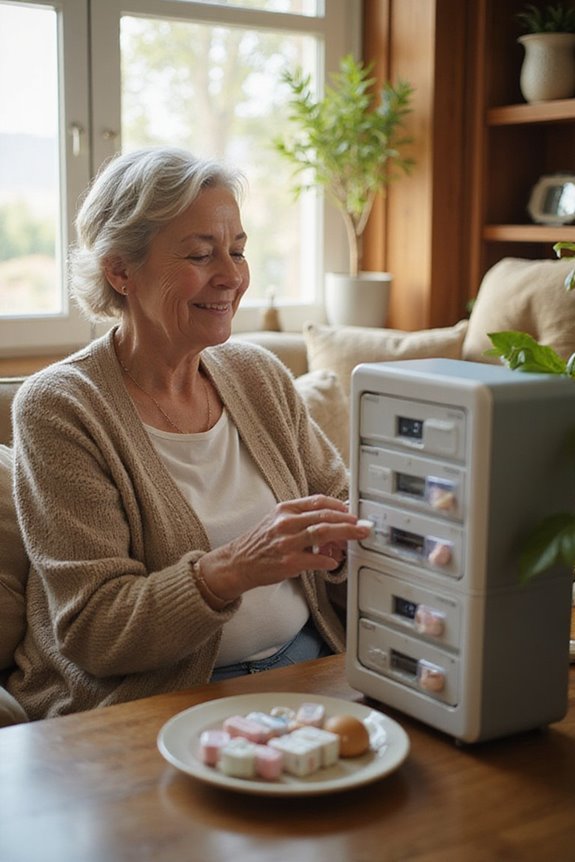Individuals with limited hand strength can utilize various daily living aids to promote independence. Recommended aids include:
- Grip aids, such as ergonomic silicone handles, enhance gripping power.
- Adaptive utensils with larger handles reduce finger movement strain.
- Personal care tools like shower chairs and grab bars guarantee safety during hygiene tasks.
- Mobility accessories, including wheelchair gloves, improve control.
These tools are designed with specific functionalities to assist users effectively. More detailed options are available for various tasks and needs.
Key Takeaways
- Ergonomic kitchen utensils with larger handles reduce finger movement and joint strain, making cooking easier for those with limited hand strength.
- Cuff-style gripping supports secure rod-shaped handles, providing stability for users with arthritis during daily tasks.
- Adaptive hygiene tools, like ergonomic grooming devices, enhance comfort and safety in personal care routines.
- Lightweight everyday grip aids, such as adaptive scissors and shopping tools, facilitate daily activities like cooking and shopping.
- Mobility aids, including walkers and pushrims, provide upper body support and improve control for users with hand weakness.
Grip Aids for Everyday Tasks
Grip aids for everyday tasks play an essential role in enhancing the independence of individuals with varying degrees of hand weakness. These tools are designed to support grip strength and enable users to engage in daily activities effectively.
Durable Multi-Purpose Gripping Aids:
- Made from tough webbing and neoprene, ensuring durability.
- Suitable for sports, gardening, and DIY projects.
Lightweight Everyday Grip Aids:
- Ideal for cooking, shopping, and personal care.
- Wearable design folds back against the wrist for convenience.
Cuff-Style Gripping Supports:
- Securely grips rod-shaped handles, ideal for those with arthritis.
- Enhances grip strength during household tasks.
Ergonomic Soft Silicone Grip Aids:
- Developed from medical-grade silicone to improve gripping power.
- Designed for adaptive utensils, providing comfort and ease of use. Additionally, using adaptive kitchen tools can significantly increase independence and safety during daily tasks.
Fine and Large Motor Skills Support
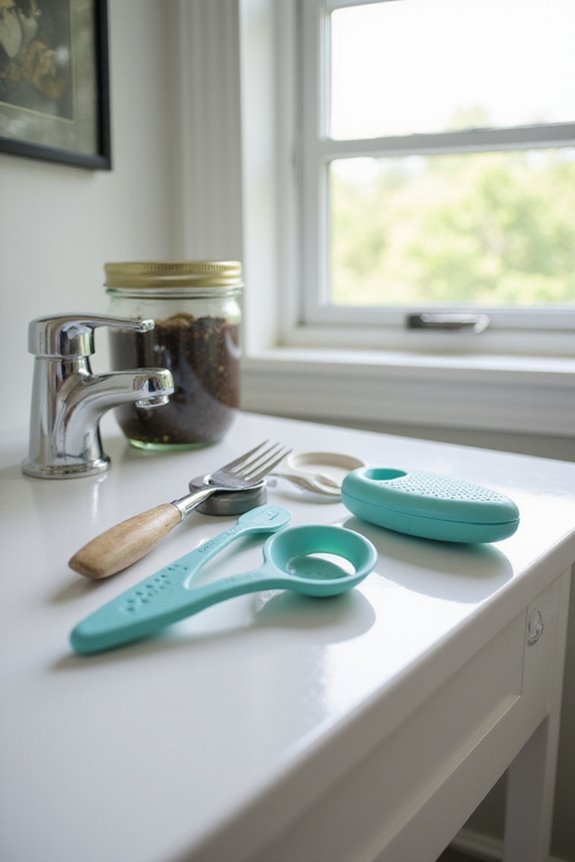
Fine and large motor skills support is pivotal for individuals experiencing challenges in hand function. The selection of appropriate assistive devices can greatly enhance fine motor control and large motor coordination.
- Assistive Devices: Modification in design, such as thickened handles and angled utensils, improves grip and reduces strain.
- Kitchen Tools: Adapted cutlery like curved forks and weighted spoons enable easier food preparation.
- Mobility Aids: Walkers and grab bars enhance upper body support, increasing stability during movement.
- Dressing Aids: Tools such as button hooks and sock aids facilitate self-dressing, promoting independence.
These devices are tailored to match specific hand impairments, ensuring ideal performance in daily tasks, ultimately enhancing safety and self-sufficiency for users. Additionally, incorporating one-handed kitchen tools can further streamline cooking tasks for those with limited grip strength.
Personal Care and Hygiene Solutions
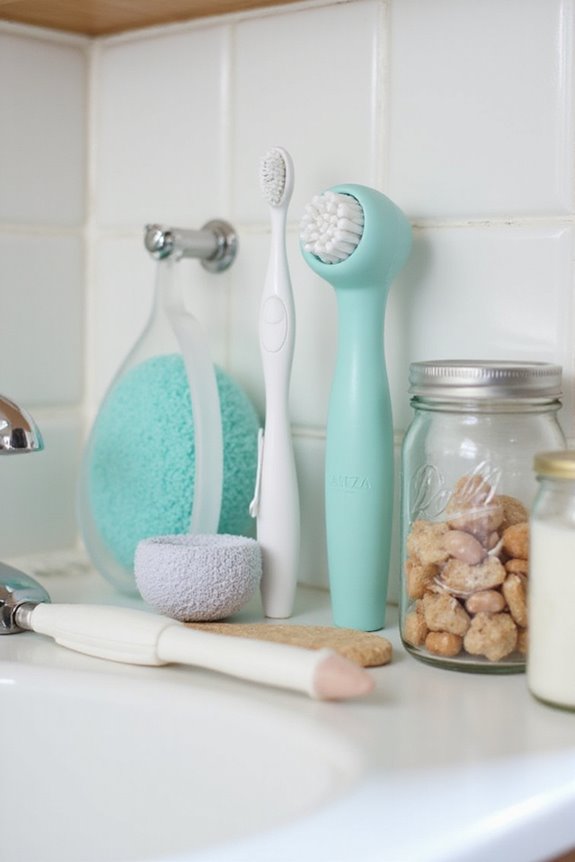
Personal care and hygiene solutions are essential for individuals with limited mobility or strength, particularly as they navigate daily routines. Adaptive hygiene tools enhance safety and comfort during personal care tasks.
Key Aids Include:
- Bathing Aids: Shower chairs and grab bars prevent falls.
- Toilet Aids: Elevated seats and grab bars guarantee stability.
- Dressing Aids: Button hooks and zipper pulls simplify clothing fasteners.
- Grooming Tools: Ergonomic grooming aids, such as combs with larger handles, facilitate hair care.
- Incontinence Products: Protective undergarments maintain hygiene.
These tools focus on usability, featuring easy-grip handles, non-slip surfaces, and automated devices. By incorporating such aids, individuals can enhance their independence and maintain dignity in personal care routines. Additionally, utilizing grab bars for safety can significantly reduce the risk of falls in slippery environments.
Wheelchair and Mobility Accessories
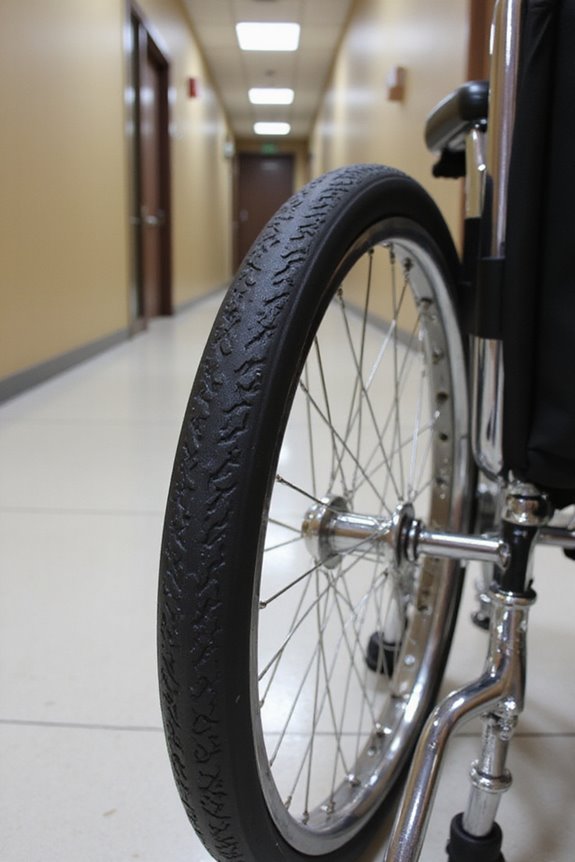
Mobility accessories play a significant role in enhancing the functionality and usability of wheelchairs. These wheelchair accessories provide essential mobility enhancements for users with limited hand strength.
- Pushrims improve grip and control.
- Wheelchair gloves reduce strain and fatigue.
- Soloc wheelchair lap belts are easy to use and distribute pressure evenly.
- Wheelchair reachers assist in picking up items without strain.
Additionally, exercise bars and treadmills designed for wheelchair users promote physical fitness. These accessories not only facilitate mobility but also support independence, safety, and comfort. Utilizing such enhancements allows users to navigate their environments more effectively and engage with their surroundings in a meaningful way. Overall, wheelchair and mobility accessories are essential for improving daily living experiences.
Kitchen Aids for Enhanced Independence
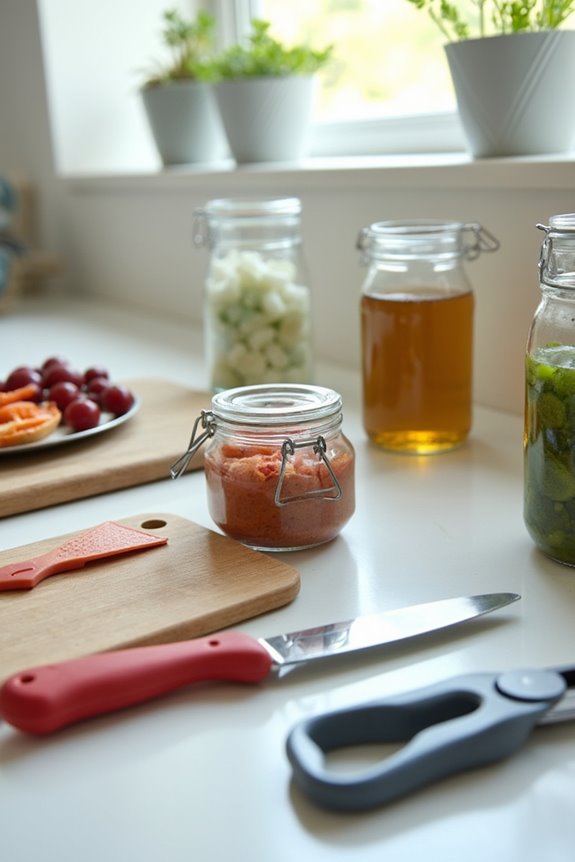
Kitchen aids designed for enhanced independence serve as essential tools for individuals facing challenges in daily food preparation and consumption.
Adaptive Utensils
- Larger handles reduce finger movement, easing grip difficulties.
- Recommended for individuals with arthritis or stroke, they decrease joint strain.
- Enhanced stability helps users with tremors maintain control.
Ergonomic Kitchen Tools
- Angled utensils require less wrist strength, allowing for easier leverage.
- Designed to fit natural hand postures, they minimize wrist pain.
- Suitable for cutting, peeling, and stirring tasks.
Lightweight and Non-slip Equipment
- Textured grips aid stabilization, preventing slips.
- Ideal for users with limited strength or coordination.
Specialized Cutting Tools
- Rocker knives and food processors reduce strain during meal preparation.
- Adapted boards stabilize food, enhancing safety and efficiency.
- Incorporating ergonomic design features ensures that these tools provide comfort and leverage for users with limited hand strength.
Gardening Tools for Limited Hand Strength
Gardening tools specifically designed for individuals with limited hand strength provide a significant advantage in maintaining a productive gardening experience.
Ergonomic Design
- Ergonomic Handles: Tools with ergonomic handles reduce strain and fatigue.
- Vertical Handles: The Bernini Easy Grip set features vertical handles for a natural wrist position.
- Material Choices: Wood and rubberized grips enhance gardening comfort.
Tool Sets
- WORKPRO 5 Pc Set: Rust-resistant aluminum tools with comfortable grips.
- Aidapt Set of 3: Non-slip rubber handles for weak grips.
- Peta Easi-Grip Tools: Long reach designs minimize bending.
Benefits
- Reduced Fatigue: Lightweight ergonomic toolsets minimize discomfort.
- Increased Confidence: Accessible tools restore gardening abilities.
- Durability: High-quality materials guarantee long-term effectiveness.
Financial and Access Considerations for Assistive Devices
Financial considerations play a pivotal role in the accessibility of assistive devices, as various factors greatly affect affordability and availability.
Cost Factors:
- Prices for daily living aids range from $15 to over $1,000, depending on complexity and features.
- Kits of combined aids can offer savings, typically costing $50 to $65.
Insurance and Financial Assistance:
- Many healthcare plans provide coverage for prescribed mobility aids.
- Nonprofit organizations may offer grants or low-cost loans for devices.
Accessibility:
- Devices are available through specialized suppliers and online retailers, enhancing access.
- Rural areas may face limited availability, necessitating early planning.
Additionally, effective utilization of kitchen aids can significantly enhance independence for individuals with limited hand strength.
Device affordability remains critical for individuals with limited hand strength, emphasizing the importance of understanding available financial assistance options.
Frequently Asked Questions
What Are the Best Brands for Grip Aids?
Evaluating the best brands for grip aids reveals options like Active Hands and Sammons Preston, known for adaptive utensils and ergonomic handles. These products enhance accessibility, fostering a sense of belonging and independence for users.
How to Choose the Right Size for Adaptive Gloves?
Choosing the right size for adaptive gloves involves understanding adaptive sizing and selecting suitable glove materials. A snug yet comfortable fit guarantees functionality, while breathable materials enhance usability, fostering a sense of belonging through shared experiences.
Can I Test Daily Living Aids Before Purchasing?
Individuals can test daily living aids before purchasing through product trials and aid demonstrations at medical supply stores, rehabilitation centers, and health expos. This hands-on approach fosters confidence and guarantees suitable choices for enhancing daily activities.
Are There Any Government Grants for Assistive Devices?
In the garden of support, government assistance blooms through various funding options for assistive devices. Programs like Medicaid and grants from the Administration for Community Living nurture accessibility, fostering a sense of belonging for individuals with disabilities.
How Do I Maintain and Clean Assistive Technology Products?
To maintain and clean assistive technology products, individuals should follow specific cleaning techniques and maintenance tips, including regular inspections, gentle cleaning methods, and proper storage, fostering a sense of belonging and responsibility for personal equipment.




